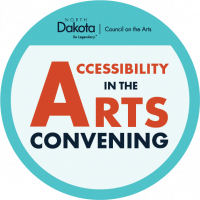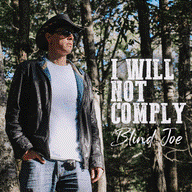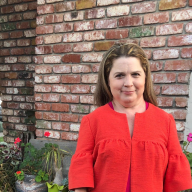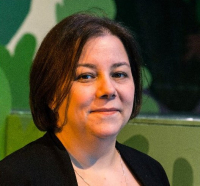 As accessibility compliance is mandated by state and federal laws, NDCA grantees are encouraged to learn more about the topic! On October 13, 2022, NDCA hosted a 4-hour ONLINE Accessibility in the Arts Convening to help explain why -- and how -- to make nonprofits and businesses more accessible.
As accessibility compliance is mandated by state and federal laws, NDCA grantees are encouraged to learn more about the topic! On October 13, 2022, NDCA hosted a 4-hour ONLINE Accessibility in the Arts Convening to help explain why -- and how -- to make nonprofits and businesses more accessible.NDCA's 2022 Accessibility in the Arts Convening:
Key Components:
- Hear testimony from artists with disabilities
- Learn the 2010 ADA Standards: minimum requirements from Tess Stanton, Trainer, Rocky Mtn. ADA Center
- Discover easy, cost-effective ways to be more accessible from Sam Gould, President, Executive Producer, Open Door Theater
- Read through the ADA Checklist with NEA representatives Beth Bienvenu, Accessibility Director and Katharine Hayward, Disability Specialist
- Consider the ideas and MAKE A PLAN!
Watch the Recordings:
The event was broken down into 8 different recordings designated with teal buttons shown here and inside the Testimonials and Presentations tabs.
- Welcome Video - Watch first!
- Watch the 3 videos located under "Testimonials" and the 3 videos located under "Presentations"
- Conclusion Video - Watch last!
Descriptions, Resources and More...
 Blind Joe Video
Blind Joe Video
- Coming from nowhere to being one of the most successful solo musicians in the North Dakota/Minnesota area in just a few short years, Joe has shared the stage with numerous top local and regional acts, as well as national recording artists such as David Allan Coe, Craig Morgan, John Anderson, James Otto, Collin Ray, Jake Owen, Buddy Guy, Bret Michaels of Poison, and many more. After multiple cross country tours, playing to thousands of fans and an excellent run on Season 9 of NBC’s The Voice, Blind Joe is fast becoming a household name.
 Scott Artley Video
Scott Artley Video
- With over ten years of professional and volunteer experience in the Twin Cities’ arts and cultural sector, Scott Artley (he/him/his and they/them/their) is Metropolitan Regional Arts Council's (MRAC's) first Accessibility Program Director. In this role, in addition to the work on grant programs, he develops resources targeted to artists with disabilities and organizations serving artists/audiences with disabilities; and coordinates efforts to ensure MRAC's own grant process, public meetings, trainings, and other activities are accessible to participants of all abilities.
 Katharine Hayward Video
Katharine Hayward Video
- Katharine Hayward, Ph.D (she/her) recently joined the National Endowment for the Arts (NEA) as the Accessibility Specialist, bringing with her 20+ years of experience in working to increase physical and programmatic accessibility of the arts and professional development opportunities for artists with disabilities. She continues this work by providing technical assistance and training to improve accessibility for staff, students, audiences and artists with disabilities. In her testimonial, Katharine will share the barriers she has encountered as an arts patron with disability and strategies to remedy them.
- Video: Access on a Shoestring Budget by Sam Gould, President, Open Door Theater
- Open Captioning? ASL Interpretation? Audio Description? Sensory Friendly Programming? If we can do it for a song, so can you! Let’s discuss best practices in a way that is affordable for all AND that your board will buy into.
- Open Door Theater is an all volunteer, non-profit, multi-generational community theater with a social justice mission of access, inclusion and diversity since 1980. It was awarded the Most Accessible Cultural Organization in the Commonwealth from the Massachusetts Cultural Council Up Initiative in 2019.
 Volunteer President and Executive Producer who has been contributing to Open Door Theater’s accessibility work for over 22 years, J. Samatha Gould, Esq. ("Sam Gould”) is an attorney, mother, leader and innovator. She’s been known to direct, produce, costume, construct, style, and writes most of Open Door’s grants. Her initiatives have brought ASL interpretation, ASL workshops and advocacy, captioning at all performances, adding audio description and tactile tours for the blind, creating sensory-friendly events, and creating safe spaces for education opportunities for audience members, and training in the creation of relaxed performances. Sam Gould was recently recognized for a lifetime achievement award for her work in accessible theater by Eastern Massachusetts Association of Community Theaters in 2020 and in 2017 by the Federation of Children with Special Needs.
Volunteer President and Executive Producer who has been contributing to Open Door Theater’s accessibility work for over 22 years, J. Samatha Gould, Esq. ("Sam Gould”) is an attorney, mother, leader and innovator. She’s been known to direct, produce, costume, construct, style, and writes most of Open Door’s grants. Her initiatives have brought ASL interpretation, ASL workshops and advocacy, captioning at all performances, adding audio description and tactile tours for the blind, creating sensory-friendly events, and creating safe spaces for education opportunities for audience members, and training in the creation of relaxed performances. Sam Gould was recently recognized for a lifetime achievement award for her work in accessible theater by Eastern Massachusetts Association of Community Theaters in 2020 and in 2017 by the Federation of Children with Special Needs.- Sam PDF Presentation
- Video: Introduction to 2010 ADA Standards for Accessible Design and Barrier Removal by Tess Stanton, Trainer, Rocky Mountain ADA
- Participants will receive an overview of the 2010 ADA Standards for Accessible Design and how to use them. We will discuss common barriers to facility access in existing facilities, some of the minimum accepted scoping and technical requirements for common elements, and practical solutions for barrier removal.
- Tess PDF Presentation
- Video: Accessibility Requirements for Arts Organizations and Brief Accessibility Checklist by Katharine Hayward and Beth Bienvenu, National Endowment for the Arts
- Federally funded projects must be accessible to people with disabilities. The National Endowment for the Arts requires applicants to consider physical and programmatic accessibility as an integral part of each project’s planning and budgeting process. The presenters will review accessibility requirements for applicants and examples of planning for accessibility such as including the cost of access accommodations in the project’s budget (e.g. sign language interpreters and audio describers) or conducting programs in accessible venues other than their own organization in order to meet accessibility requirements.
- Beth and Katharine PDF Presentation
- Access Granted, a Rocky Mountain ADA Blog with ADA News and Updates
- Accessibility Planning and Resource Guide for Cultural Administrators
- Accessible Presentations Guide
- Accessible Social Media Guide
- ADA 30th Anniversary Toolkit and Information
- ADA Checklist for Existing Facilities
- ADA Compliance Checklist
- Campaign for Disability Employment Fact Sheet
- Designating an Accessibility Coordinator for Your Organization
- Disability Etiquette
- NEA Brief ADA Checklist
- North Dakota Assistive
- October is National Disability Employment Awareness Month
- Resources to Help Ensure Accessibility of Your Virtual Events for People with Disabilities
- Rocky Mountain ADA
- Rocky Mountain ADA Course Catalog with free, self-paced ADA classes
- Voices from the Field: Celebrating the 30th Anniversary of the Americans with Disabilities Act
2020 Recording of NDCA Online Accessibility Convening
- The first 15 mins unfortunately did not get recorded but a you can view a copy of the presentation.
- ASL interpretation was available during the presentation if you pinned their screen - unfortunately it is not available in the recording, but the Convening is closed captioned - to view click the "CC" icon on the YouTube video.
- If interested, you can view the resources and information placed in the Chat section.
